When you welcome a new baby into your family, their health immediately becomes one of your top priorities. From their first breath, babies depend on us to provide an environment that promotes their well-being and supports their delicate developmental stages.
This article will guide you through the vital Baby Health Tips with a special focus on areas such as optimal nutrition, sleep, hygiene, and developmental milestones.
Table of Contents
Optimize Nutrition for Safety
Proper nutrition is the bedrock of infant health, offering the nutrients necessary for growth. Breastfeeding is recommended due to its balance of nutrients and antibodies that protect against illness. According to the World Health Organization (WHO), exclusive breastfeeding for the first six months of life improves infant survival rates and reduces the risk of many illnesses.
For those who use formula, it’s important to choose one that meets nutritional needs. It is keeping an eye on any potential concerns such as food allergies or intolerances.
One such concern is the rare but serious condition known as necrotizing enterocolitis (NEC), which predominantly affects premature infants.
NEC causes intestinal inflammation and damage, and its incidence is reportedly higher in infants who are formula-fed compared to those who receive breast milk. TorHoerman Law states that brands like Enfamil and Similac are two options to be concerned about it. They have been linked to NEC.
Parents and caregivers should consult with healthcare providers for specialized formulas or feeding strategies to lower the risk of NEC. The last thing you want is to be one of those parents who are currently filing NEC baby formula lawsuit cases.
Establish a Healthy Sleep Routine
Sleep is as crucial as nutrition for an infant’s health, influencing physical growth, brain development, and immune function. Newborns typically have short sleep cycles and will often wake during the night, but these patterns will evolve as they grow.
Ensuring a safe sleep environment and establishing a bedtime routine can improve sleep habits and lower the risk of sudden infant death syndrome (SIDS). The American Academy of Pediatrics found that consistent use of a safe sleep environment can reduce the risk of SIDS by up to 50%.
Sleep is not merely a period of rest for babies but a critical component of their healthy development. During the first few months of life, infants need a significant amount of sleep, as it directly supports their rapid physical growth, brain development, and the maturation of their immune system.
Establishing a healthy sleep routine early on is beneficial for both the baby and the parents.
Maintaining Proper Hygiene
The immune system of a baby is still developing, which makes them more susceptible to bacteria and viruses. Proper hygiene routines can significantly reduce the risk of illness. While babies do not require daily baths, maintaining a schedule of bathing two to three times a week is generally sufficient unless they’ve become particularly dirty.
Overbathing can strip the skin of its natural oils and lead to dryness or irritation. When you do bathe your baby, use lukewarm water and mild, hypoallergenic baby washes that are gentle on the skin and eyes. Each bath should be quick to avoid chilling but thorough enough to clean creases and folds in the skin, which are prone to accumulating sweat and dirt.
Diaper hygiene is another area of focus. Diapers should be changed frequently to prevent the warm, moist environment from breeding bacteria and causing diaper rash. Each change should involve a thorough cleaning with gentle wipes or a damp cloth. If a rash appears, ointments or creams may be needed to protect the skin and promote healing.
Monitor Developmental Health
Understanding and monitoring developmental milestones gives caregivers a framework for noting the progression of a child’s motor, language, social, and cognitive skills.
Each milestone completed signifies that your baby is acquiring new skills and abilities. The CDC recommends screening for general development when your infant is 9, 18, and 30 months old. Similarly, autism should also be checked for at 18 and 24 months.
While it’s important to track these milestones, it’s also necessary to create an environment that encourages developmental progress.
This can include providing age-appropriate toys. It stimulates learning and motor skills, engaging in interactive play. It is ensuring that the baby has a safe space to explore and move about.
Parents and caregivers should also be aware of the signs that might warrant further medical evaluation. If a baby never meet multiple milestones or there are significant changes in behavior, such as a loss of skills they once had or excessive fussiness, it may be indicative of a developmental problem.
Other red flags include is not responding to loud noises. It is not following moving objects with their eyes, difficulty sucking or swallowing, or limp limbs.
Conclusion
The journey of raising a newborn bring anticipation, and the unexpected. As you watch your little one grow and thrive, remember that your actions lay the foundation for their health and development.
This article is about Baby Health Tips that helps you to understand your kid well. Your intuition as a parent is a powerful guide. Trust in it, and enjoy the unique path you and your baby are carving out together.




